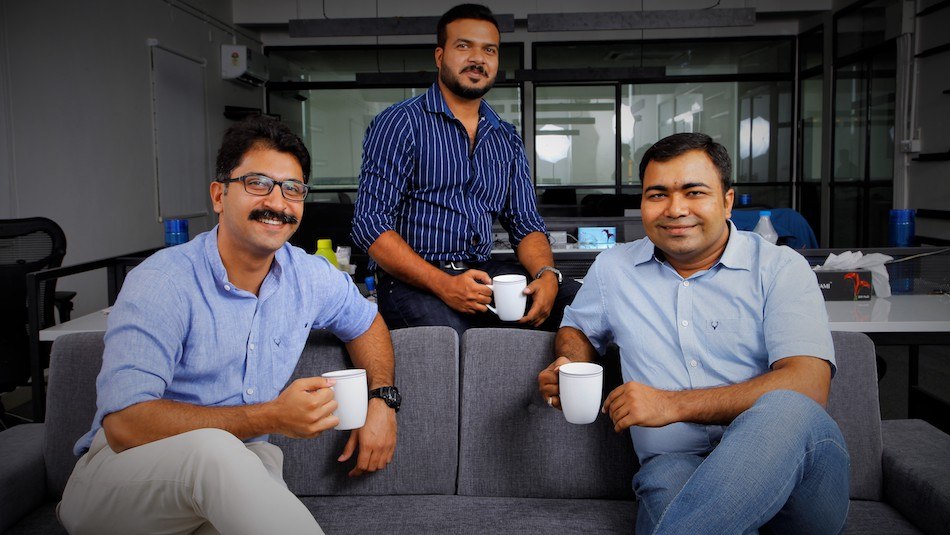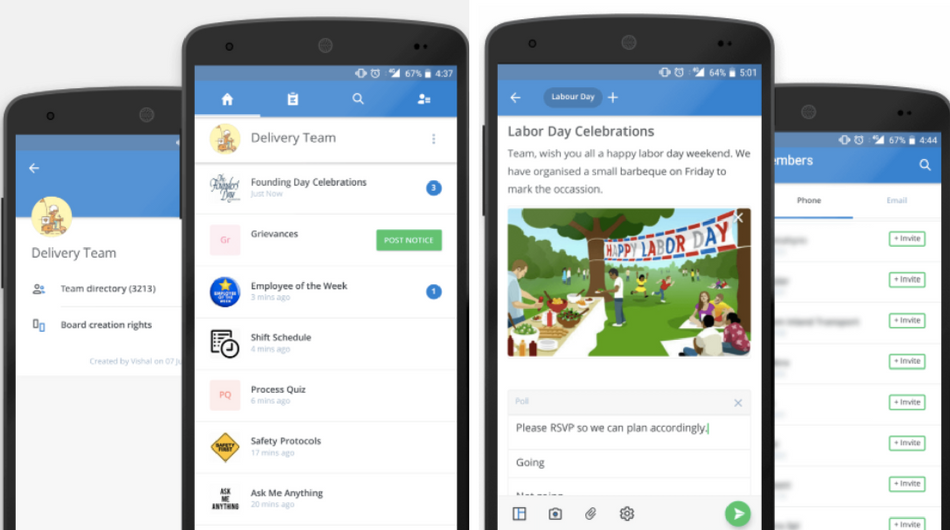
Image credit: Tech in Asia’s Andre Gunawan.
Mentor is a word that gets thrown about a lot in the startup world. A lot of people use it very loosely – some claiming that so-and-so big name is their mentor, some assuming mentorship themselves when they aren’t really leaving anyone any wiser.
A mentor, in the real sense of the word, is an individual committed to helping others become fuller versions of who they are. But finding them involves a lot of hard work. This article will take you through how a young startup with a software-as-a-service (SaaS) product went about finding the right mentor for it.
Abstract:
Noticeboard – founded by three highly trained engineers with top management degrees – built a work communication tool for large fleets of ground staff. In January 2017, the first iteration of the product was out, and it bagged a client within a month. Soon, the startup raised US$1.2 million in venture capital funding.
Noticeboard went on to rope in more enterprises in the logistics, retail, and hospitality sectors in India as clients, but faced challenges like most young companies. Should they continue to focus on India as the market for their software or should they go after the more lucrative US market? There are several strong competitors out there – Crew, Red e App, Beekeeper, Connecteam, Staffbase, Microsoft’s Teams, and even Slack. Noticeboard’s founders could do with some expert help to march on or even surge ahead.
See: 2 billion non-desk workers are strangers to email. These founders built a Slack for them.
The learning objective of this case study is to give a frame of reference other young startups can use to find the right mentors.
The premise
Noticeboard’s founders Vishal Gahlaut, Vishesh Dahinwal, and Sarath Chandran used to work with Myntra, India’s leading fashion ecommerce company. Flipkart acquired Myntra in 2014 and has been running it as an independent product under the Flipkart umbrella.
At Myntra, Gahlaut, Dahinwal, and Chandran found that the customer’s happiness rested heavily on how well trained its frontline staff were. To ensure that, the top management of the company had to communicate clearly and constantly with the ground fleet of about 5,000 workers. They were mostly people whose first brush with technology was through their smartphones. They needed a communication tool much simpler than Slack but efficient enough. That’s how Noticeboard was born.

Noticeboard co-founders [from left to right] Vishal Gahlaut, Sarath Chandran, and Vishesh Dahinwal. Photo credit: Noticeboard.
The stint at Myntra had exposed Gahlaut, Dahinwal, and Chandran to the challenges of scaling up a company as well as how some of the brightest minds in the Indian startup space tackled those. So when the trio decided to start Noticeboard, they had a circle of experts to discuss the idea with, including the founder of Myntra, Mukesh Bansal, and its chief technology and product officer, Shamik Sharma.
Noticeboard tasted early success, bagging several enterprises in India, including Myntra, as customers. Around six months ago, the founders decided to find mentors who would help them in the next phase of their startup’s growth.
Steps that led to the right mentor
The founders made a list of potential mentors to begin with. These were expert entrepreneurs and technologists with years of experience in India and abroad. All of them had diverse skillsets which a young startup could gain from.
Gahlaut, Dahinwal, and Chandran reached out to everyone in their list and requested meetings to discuss Noticeboard. “Just figuring out what kind of value we could expect from the people we have access to took some time. And to figure out how much time we would need from a mentor. Internally, we had several deep discussions on these,” Gahlaut says. He also did a lot of research on mentorship before reaching out to people.
They shortlisted five from their list and met them each over coffee. “We shared what we were building and how we were thinking about the business, and asked what they thought about it all.”
The discussions that ensued were mostly about the space Noticeboard was in, whether it was an investable business or not, and didn’t really go into the specifics. Except with Shamik Sharma. “He was very different. Instead of talking about the space, he talked about how one should think about the space. He wasn’t polite about what we were doing. “I don’t think you have thought this one through; these are the gaps you might have,” he pointed out things that seemed like mistakes. We debated with him, explained things from our point of view, he listened and responded,” Gahlaut recalls.
The founders asked for a second meeting with all five of the potential mentors on their shortlist. Some of them didn’t have time for the second meeting. That, Gahlaut says, was an important indicator. “When you ask someone you know for their time, they tend to say yes the first time around. But a second meeting will happen only if what you have to say is exciting for them as well, and is worth their time,” Gahlaut points out.
“The generic advice that we got wasn’t very useful for us. Nor was it the best use of their time for the people who were giving that to us.”
Finding the man
The Noticeboard founders had four “very long” meetings with Shamik Sharma, even before they talked about mentorship.
“We got very deep into every aspect of the company – from where we sell to whom we sell to, its challenges, how the structure of the team will be, and so on. He was already almost acting like a mentor when we told him that we found our discussions with him extremely useful and that we would like to formalize the relationship,” Gahlaut says.
Why the need to make things official if it was working well already? “You don’t want to be in a position where something that you find valuable goes away tomorrow because of some other priorities,” explains Gahlaut. That is how Noticeboard decided to ask Sharma to not only join them as a mentor, but also invest in the startup.
“We said that it [the mentor role] won’t come without you investing in us,” Gahlaut recalls telling Sharma. “If you are invested in our fortunes in some manner, we will be among your priorities and we will also have a right to your time.”
So Sharma made a small investment in the company and became a mentor to them officially.
The formal arrangement they arrived at was that Sharma would spend a whole day with the Noticeboard team every fortnight. He was to work with them on the tech and product side largely. He would also help them with hiring, sitting in for recruitment interviews for senior positions.

Gahlaut gives an example of where Sharma comes in. How to manage notifications inside the Noticeboard app has been a niggling pain. “The best apps in India have a notification delivery rate of just about 70 percent,” Gahlaut points out. “For a product like ours, which is a communication platform, notification is our bread and butter. So we spent a lot of time with Shamik on ways to crack this. Should we tweak the notification engine or build something on top of Google Voice to enhance read rates and open rates, and so on.”
They have been brainstorming “everything, from the way the Noticeboard feed happens to the admin dashboard that we are building” with Sharma.
“From our perspective, the onus is really on us to draw maximum value out of these sessions with him. Given the stage that we are at, there is a lot to be done in pure execution terms as well. So we have to keep iterating and pushing out tech every fortnight and share it with him,” Gahlaut says.
Aces up the mentor’s sleeve
Shamik Sharma has had a long tech career in the US.
- After completing masters in computer science from the University of Maryland, College Park, in 1995, Sharma did research on distributed systems.
- He published two papers as a research associate at the university before joining HP as the founding member of its E-Speak team.
- He filed for seven patents during a four-year stint at HP.
- He co-founded Confluent Software. It got acquired by Oblix which in turn was bought by Oracle.
- He headed tech and engineering teams at SOA Software, Yahoo!, StumbleUpon, RockYou, and Lytro before joining Myntra towards the end of 2012.
- At Myntra, he helped the company “grow from US$30 million to US$1 billion (annualized) revenue,” in four years. He built up a tech team of over 400, and launched several projects such as using AI for fashion design.
“Shamik championed the mobile-first thinking at Myntra, bringing in a new wave across the Indian startup community. He understands enterprise tech and the mobile space deeply,” Gahlaut says. Myntra was the first paid account for Slack in India. The move to Slack for work communications at Myntra was led by Sharma.
What makes Sharma special for Noticeboard is not just his tech expertise and connections. “Typically anyone who you know well wouldn’t shy away from connecting people they know. That is not something we were looking for specifically in a mentor. We were scouting for someone who can help us in areas we were not smart about,” Gahlaut says.
“We were going to be a tech product company in the enterprise space. As someone who understood enterprise users, had deep interest and understanding in communication technologies, and was a thought leader in the mobile-first thinking, Shamik was the right mentor for us,” Sharma’s experience in the US is also valuable to Noticeboard as they are thinking of expanding beyond India.
While Sharma has not joined the company’s board of directors, he is the most clued-in hand at Noticeboard after the three founders. “From who are the customers, who is reacting in what manner, what are the products we might have synergies with, and so on.”
Sharma is advising a few other startups as well – Scripbox, CureFit, Treebo, SquadRun, and BonFleet, to name a few. “When he is meeting them, he is also thinking of ways how NoticeBoard can partner with them. He keeps learning about the space, sending us ideas, debating with us,” Gahlaut says.
Things to remember

Photo credit: Pixabay.
Many entrepreneurs assume that having a big name associated with their company will help in raising funds and so on. But Gahlaut puts a higher premium on insight and time. “Ultimately, what counts is if you have an expert resource, you need his time more than anything else. That is the tricky one you should find ways to ensure.”
- Anyone who is not excited enough in your business to invest his own money into it will probably not be in a position to be an effective mentor to you. “That is because anyone who is good enough to be a mentor has 40 other things to do. Everyone wants their advice, everyone wants their time. And there is limited amount of time they have,” Gahlaut says.
- Unless the founders and the potential mentor are on the same page, the relationship will be just about a meeting or two over coffee where you would exchange pleasantries, get some good advice, and make a few connections on email. That is not mentorship.
- You need to have a clear and open discussion with the person on what will be his contribution, how will you compensate him for his time. Noticeboard has a few other industry leaders – founder of TaxiForSure Aprameya Radhakrishna, Blackbuck founder Rajesh Yabaji, and YuMe co-founder Jayant Kadambi – as angel investors, but Sharma is their only official mentor. “He has more equity than what he would have got from the amount he invested in the company. That’s because we are compensating him for his time as well,” Gahlaut says.
This post The art and science of picking the best mentor for your startup: a case study appeared first on Tech in Asia.
from Tech in Asia https://www.techinasia.com/case-study-on-how-to-pick-right-mentor-for-startup
via IFTTT
No comments:
Post a Comment